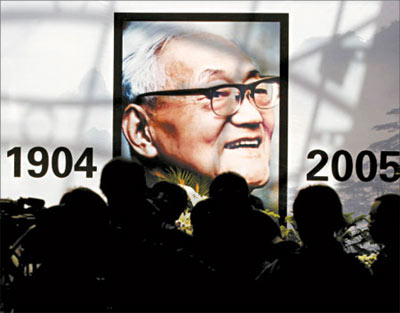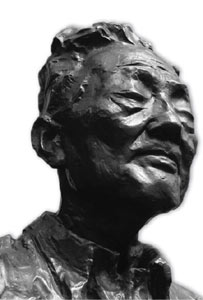
It is said that to become a good writer, you have to be
especially sensitive, innocent or philosophic.
Ba Jin, or Pa Chin, one of the most important and widely read
Chinese writers of the 20th century, no doubt combined the three
qualities.
After a long journey of 101 years in the world that he loved so
passionately, the revered writer, who preferred to be known by his
pen name Ba Jin rather than his given name Li Yaotang or Li Feigan,
died of cell cancer at a hospital in Shanghai on Monday
evening.
"Ba Jin is irreplaceable in China's literary pantheon," remarked
Qi Ming, 72, a retired television cameraman and Ba Jin's 20-year
friend.
Although China's literature world has been shoved to the
sidelines for some years since mass entertainment filled the void,
almost all the major newspapers, television and radio stations
in China lavished their pages and air times on news of Ba Jin's
death.

Tribute: People lay wreaths in front
of a huge portrait of Ba Jin, one of the past century's literary
greats, at the National Museum of Modern Chinese Literature in
Beijing yesterday. |
Of all the major writers active in the first half of the 20th
century, Ba Jin was probably the only one still living until his
passing.
Ba Jin embraced life even as he suffered in the end. In the past
six years, Ba Jin had lost the ability to walk or speak because of
Parkinson's disease and lung complications.
In early 1999, he reportedly refused to have a major operation
to insert a pipe into his throat to facilitate his breathing until
he was finally persuaded by his family members and friends.
"From the day on, I live for you," he reportedly said, as he
pointed to those around him in his hospital room.
"He was the noblest man," said Li Xiaotang, Ba Jin's son
with his late wife Xiao Shan (1918-1972). "He always paid attention
to other people's feelings and was willing to sacrifice his
own."
The sensitive, altruistic touch in his writing and characters
has been the major attraction of Ba Jin's creations.
Among his literary works amounting to 13 million Chinese
characters, Ba Jin was best known for his trilogy Torrent
(Jiliu), which was written between 1931 and 1940 and
included three semi-autobiographical novels.
The three novels, namely The Family, The
Spring and The Autumn, hit a chord with China's youth
at the time and remained steadfastly popular throughout the
century.
The novels attacked the traditional Chinese family structure and
depicted the struggles and tragedies, love and hatred of the young
generation in a saga of familial decline.

The bronze statue of Ba Jin is one
of the treasures at the National Museum of Modern Chinese
Literature. |
Gao Juexin, the hero of The Family, has been widely
acclaimed as one of the most successfully depicted characters in
modern Chinese literature.
The young man's passion to explore the world was fuelled by the
enlightening "May Fourth Movement" or the "New Culture Movement"
sweeping major Chinese cities in the 1910s. But he finally decided
to stay in the courtyard of his declining feudal family, while his
two younger brothers left it.
"The whole middle and middle-upper class were shocked at the
novel because they could see part of themselves in Gao. The hero
was a symbol of Chinese intellectuals in a time of changes," said
Chen Sihe, professor and dean of the Department of Chinese Language
and Literature at Fudan
University.
"What's more, the writer was exploring the mind of Gao with
understanding and sympathy besides criticism," he added.
The Gao family was inspired by the writer's own family, who
hailed from Chengdu, capital of southwest China's Sichuan
Province. The writer's father was a wealthy local county
magistrate at the end of the Qing Dynasty (1644-1911).
Ba Jin and his three brothers all received a broad education. Ba
Jin himself studied English at the Chengdu Foreign Language School,
travelled to Shanghai in 1923 and then to Nanjing, where he entered
the preparatory school affiliated with the Southeast China
University.
From 1927 to 1929, his family supported his stay in France.
The burdens of the decline of Ba Jin's family were
all borne by his eldest brother, who abandoned his own dreams,
sold family property to make ends meet, and committed suicide in
the early 1930s when family businesses went bankrupt due to
mismanagement.
Ba Jin was committed to anarchism and socialism in his early
years. His pen name was chosen from the Chinese transliterations of
the first syllable of the name Bakunin and of the last syllable of
the name Kropotkin, two anarchists he admired.
However, Ba Jin was never prepared to become an revolutionary
anarchist as his friends, according to Professor Chen, who has
been studying the writer and his works since 1977.
While some other major or revolutionary writers like Lu Xun
(1881-1936) believed writing to be his weapon as a soldier, Ba Jin
regarded it as a critical insight into himself and into those
around him.
His first novel Destruction (Miewang),
completed in 1928 during his stay in France, was about a depressed
young anarchist who found himself too weak to take any decisive
actions.
Reflecting on the major works he wrote between 1927 and 1946, Ba
Jin wrote in the preface to the English version of
his Selected Works of Ba Jin: "When I am burning with
passion, my heart is about to explode and I don't know where to
place it; I feel that I must write. I am not an artist, and writing
is the only part of my life, which, like my works, is full of
contradictions.
"The conflicts between love and hate, thought and action, reason
and emotion combine to weave a net enwrapping my whole life and all
my works."
Being courageous enough to delve into and dissect his weakness
and to share it with his readers, Ba Jin was one of the first
Chinese intellectuals to share his true feelings about the chaotic
"Cultural Revolution" (1966-76).
His prose collection, Random Thoughts (Suixiang
Lu), has been widely acclaimed as "the greatest work of
soul-searching of our time."
"It is not I who is unwilling to forget or to conceal. It is the
bloody facts, the nightmares, that have kept me from forgetting,"
Ba Jin wrote. "Loving truth and living honestly is my attitude to
life. Be true to yourself and be true to others, and thus you can
be the judge of your behaviour."
Professor Chen attributed Ba Jin's longevity to his ability and
courage to be true always to himself and to others.
"In this way, the writer could find the happiness of life, which
has been concealed from too many of us," he said.
Chen remembered his meeting with Ba Jin in 1994 at Ba Jin's
hospital room. The writer, who had suffered several major bone
fractures, was then crouched in his bed after working hard on
polishing translated literary works from Russian to Chinese.
However, he insisted that he recite the preface to his
translation collection, asking Chen to write it down for
him.
"I was surprised to find that every sentence of the preface was
filled with a burning passion for life. I couldn't imagine the
passion belongs to a 90-year-old man suffering from so much pain,"
Chen said.
Ba Jin never failed to express his passionate, persevering
spirit.
"If you cannot find happiness in yourself, look for it in the
people and you will see that happiness shines amid the most
difficult lives," Ba Jin quoted from Russian music composer
Tchaikovsky in his preface.
(China Daily October 19, 2005)
|

